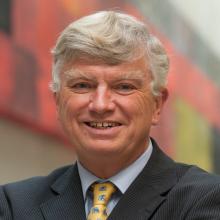Andrew Briggs
Emeritus Professor of Nanomaterials, University of Oxford
Senior Research Fellow, St. Anne’s College, Oxford
Emeritus Fellow, Wolfson College, Oxford


Emeritus Professor of Nanomaterials, University of Oxford
Senior Research Fellow, St. Anne’s College, Oxford
Emeritus Fellow, Wolfson College, Oxford
Andrew Briggs is Emeritus Professor of Nanomaterials at the University of Oxford and Executive Chairman of QuantrolOx. His research interests focus on nanomaterials for quantum technologies and their incorporation into practical devices, and the nanoscale thermodynamics of timekeeping and learning. From 2002-2009, he directed the UK Interdisciplinary Research Collaboration in Quantum Information Processing. In 2021 he co-founded QuantrolOx to commercialise machine learning for tuning and characterizing quantum devices, with performance that greatly exceeds what is feasible for humans.
He is a Fellow of St Anne’s College, Oxford, Fellow of Wolfson College, Oxford, Honorary Fellow of the Royal Microscopical Society, Fellow of the Institute of Physics, Fellow of the Cambridge Philosophical Society, Fellow of the International Society for Science and Religion, and Member of Academia Europaea. He has over 650 publications, with nearly 32,000 citations.
His books for a general readership include “The Penultimate Curiosity: How Science Swims in the Slipstream of Ultimate Questions”, for which there is a documentary film and a six-book series for children; “It Keeps Me Seeking: The Invitation from Science, Philosophy and Religion”; and “Human Flourishing: Scientific Insight and Spiritual Wisdom in Uncertain Times”. His most recent book carries endorsements by the Archbishop of Canterbury and the Astronomer Royal and won a 2023 ISSR Book Prize.
1. Research in my laboratory focusses on quantum control in small structures. For example, we can take a single molecule, attach two wires to it, and connect it across a gap about 2 billionths of a metre wide in a layer of carbon one atom thick. We can then study how electricity flows through the molecule one electron at a time. We can measure vibrations in a tube of carbon atoms about 1/50,000 the diameter of a human hair, and see how the nineteenth century laws of thermodynamics developed for steam engines apply to such a tiny structure. We use machine learning (the fastest moving topic in AI) to take real time decisions in the lab about what to measure next and to perform the experiments faster and better than a human can. See https://andrewbriggs.org/
2. How do we combine scientific insight and spiritual wisdom in promoting human flourishing? This is the subject of my book with Michael Reiss, Human Flourishing: Scientific insight and spiritual wisdom in uncertain times, published in 2021 by Oxford University Press. The ISSR Book Prize citation was, ‘Briggs and Reiss have provided an excellent and much-needed conceptual framework for understanding “human flourishing”, and how scientific developments and spiritual wisdom contribute to it. They take us through the different dimensions of human flourishing (material, relational and transcendent); the pillars of human flourishing (truth, meaning, and purpose), and discuss how all this is working itself out in different aspects of the contemporary world. Their writing is accessible and gripping, full of striking anecdotes and pithy summaries of scientific research.’ It is one thing to write about flourishing, it is another to make it happen.
3. How do we equip church leaders for courageous and confident leadership in issues involving science, embracing science as a God-given resource for the life of faith, and offering the wisdom of faith to the impact of science? This is the vision for an initiative in the form of the Anglican Communion Science Commission. There will be needs and opportunities for transdisciplinary research with bishops by members of the Global Faculty Initiative, recognising the validity and significance of different systems of knowledge.
4. How can AI be commercialised for accelerating technology? In 2021 I co-founded QuantrolOx to meet the growing demand for machine learning developed in my laboratory for tuning and characterising components for quantum computing. The European Innovation Council awarded €105M funding and the Jury commented, 'The company is of strategic importance for EU sovereignty in quantum computing.'